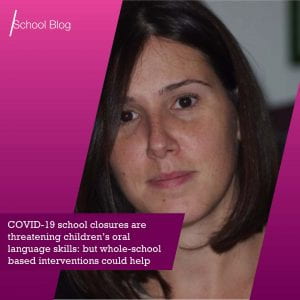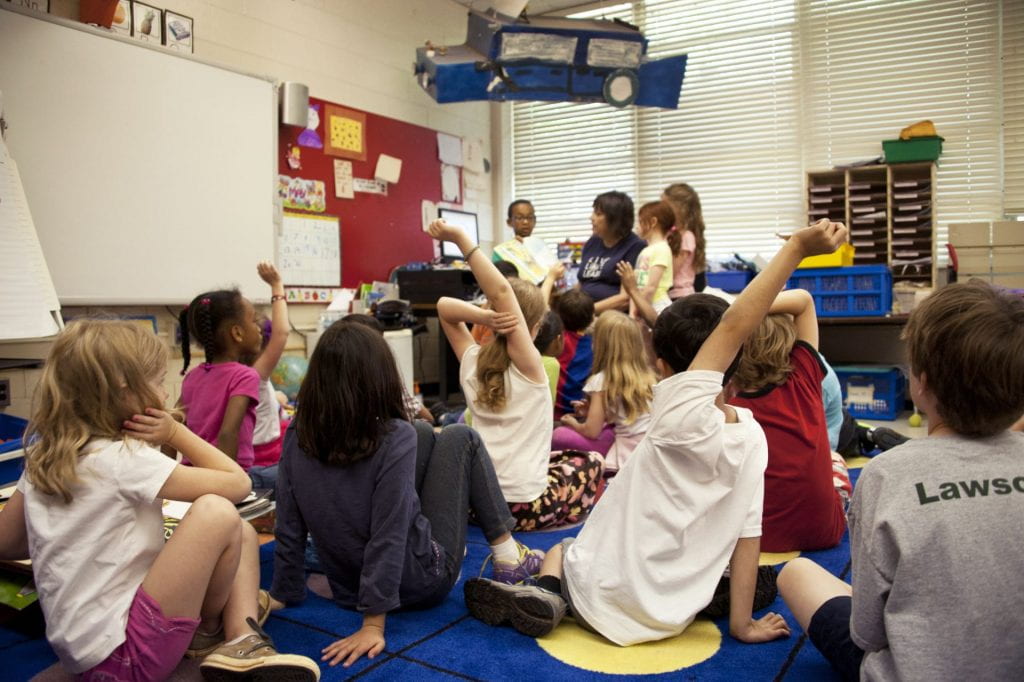 Oral language skills are critical for learning, and they matter now more than ever, writes Dr Ioanna Bakopoulou, SoE, University of Bristol
Oral language skills are critical for learning, and they matter now more than ever, writes Dr Ioanna Bakopoulou, SoE, University of Bristol
Capabilities such as vocabulary knowledge, narrative skills and active listening are foundational for young children’s learning. Developed both at home and in school, these capabilities are known as oral language. Oral language is essential for young children’s learning, in particularly their literacy development and their ability to access the curriculum.
Oral language skills have always mattered, but they matter now more than ever.
The Covid-19 pandemic has widened the already stubborn ‘language gap’, that is the difference between the language levels of children from poorer backgrounds vs their more affluent peers. Ofsted have raised concerns that children hit hardest are ‘regressing in basic skills and learning, including language, communication and oral fluency’1. Recent research found that 92 per cent of teachers think school closures due to the Covid-19 pandemic have contributed to a widening of the ‘word gap’ and that 94 per cent found it challenging to support pupils’ vocabulary development while teaching remotely during the first national lockdown2.
This suggests that the inequalities facing children in our school system are being exacerbated by the Covid-19 pandemic. Pupils from poorer backgrounds have suffered the most and face a greater loss of learning as a result of school closures3.
The likely increase in the disadvantage gap highlights the importance of school-based, early language interventions. Support for oral language offers an important means by which we can address the injustices worsened by the pandemic.
Oracy All-Party Parliamentary Group offers a vision for change for educational professionals
The All-Party Parliamentary Group on Oracy ran an inquiry into the value, impact, and provision of, and access and barriers to oracy (learning to talk and learning through talk) in schools, which I was pleased to contribute to. Released in December 20204, its findings are timely as UK schools closed once again in early January to halt the spread of COVID-19.
The report calls for a consistent approach to oral language in schools and better support for teachers. Fewer than half of teachers feel their school’s approach to supporting oral language is consistent or embedded5. Of course, teachers are facing enormous and unprecedent pressures. A focus of any work needs to be how the school system can better support teachers to harness children’s oral language skills and move past the wider assumptions that oral language skills will just be ‘picked up’ as children progress through school without explicit teaching. And this is where the Supporting Spoken Language in the Classroom Programme comes in.

Supporting the development of oral language: the importance of whole-school based interventions
Supporting Spoken Language in the Classroom (SSLiC) is a programme that aims to improve communication and learning outcomes for all children in a primary school setting. SSLiC seeks to achieve this aim by supporting practitioners to embed communication in their school’s policy and everyday practice.
Across the academic year 2017-2018, the SSLiC programme was carried out in collaboration with ten primary schools across London and the South East. Each school had access to the most up to date research findings, a school self-assessment audit tool, an evidence-based classroom observation tool and received regular support from facilitators with research and school practitioner backgrounds.
The participants in the SSLiC programme implemented a variety of changes in their schools at pupil, practitioner and school levels based on an action plan which was tailored to each school’s priorities and needs. Ultimately, all participants reported that they used the SSLiC programme to raise the profile of the importance of oral language for children’s educational attainment6.
In the 2019-2020 academic year, five primary schools in Bristol participated in the SSLiC programme as part of my ESRC Impact Award project. Three of these schools have continued with their work since the return to schools in September 2020 following the first national lockdown, recognising an even greater need to take a whole-school approach and enhance children’s oral language skills.
The inevitable widening of the gap in educational outcomes between children from advantaged and disadvantaged backgrounds will be a significant fallout from the Covid-19 crisis. As we collectively consider ways in which this might be reversed when our society and schools start to return to normal, SSLiC and other programmes proven to be effective, will be of central importance not just for ‘recovery’ but also for ‘building back’ stronger and fairer.
Further information
SSLiC was originally developed and facilitated by Dr Ioanna Bakopoulou at UCL Institute of Education and continued at the University of Bristol. For more information about the programme, please contact Ioanna.
Contact
Dr Ioanna Bakopoulou at ioanna.bakopoulou@bristol.ac.uk
References
1 Ofsted (2020) ‘Children hardest hit by COVID-19 pandemic are regressing in basic skills and learning’, press release, 10 November, https://www.gov.uk/government/news/ofsted-children-hardest-hit-by-covid-19-pandemic-are-regressing-in-basicskills-and-learning [accessed 14 November 2020].
2 Menzies L, Yeeles P, Millard W, Baars S and Oxford Education Language Group (2020) Bridging the Gap at Transition, Oxford: Oxford University Press, https://cfey.org/reports/2020/10/bridging-the-word-gap-at-transition [accessed 14 November 2020].
3 Hutchinson J, Reader M and Akhal A (2020) Education in England: Annual report 2020, London: Education Policy Institute, https://epi.org.uk/publications-and-research/education-in-england-annual-report-2020 [accessed 14 November 2020].
4 Oracy All-Party Parliamentary Group (2020). Speak for Change: Initial findings and recommendations from the Oracy All-Party Parliamentary Group Inquiry. https://d5119182-bdac-43d5-be55-e817e7736e5b.filesusr.com/ugd/2c80ff_33e3208ce4dd4764b154682488c53ef7.pdf
5 Teacher Tapp polling, Oracy Network, March 2020.
6 Bakopoulou, I., & Vivash, J. (2019). Pilot of Supporting Spoken Language in the Classroom Impact Case Studies 2017-2018. Centre for Inclusive Education, UCL Institute of Education.

